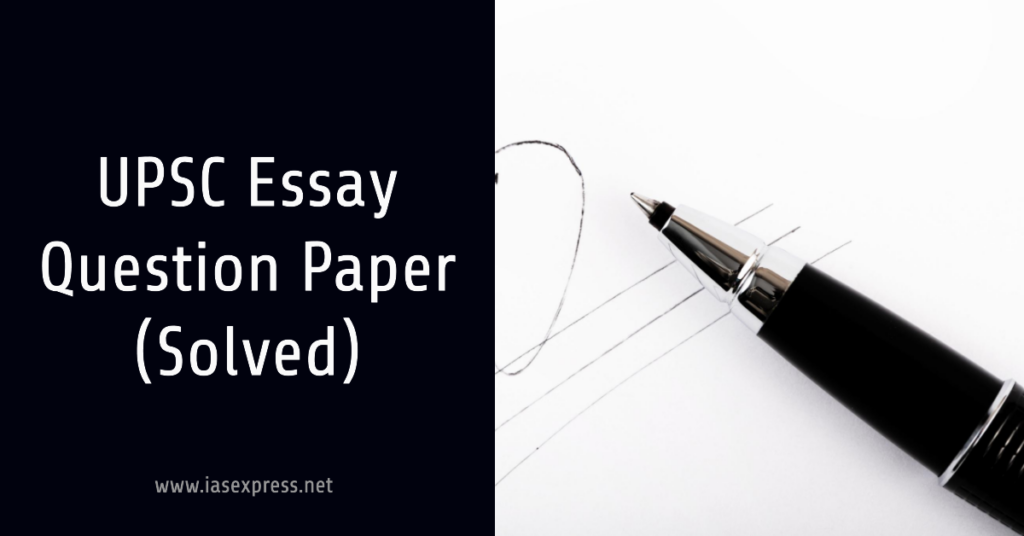Essay Question Paper (Analysis & Solutions) – UPSC Civil Services Mains 2023

Questions
Write two essays, choosing one topic from each of the following Sections A and B, in
about 1000 – 1200 words each: (125×2=250 marks)
SECTION A
(Click the links to read the solutions)
- Thinking is like a game, it does not begin unless there is an opposite team.
- Visionary decision-making happens at the intersection of intuition and logic.
- Not all who wander are lost.
- Inspiration for creativity springs from the effort to look for the magical in the mundane.
SECTION B
(Click the links to read the solutions)
- Girls are weighed down by restrictions, boys with demands – two equally harmful disciplines.
- Mathematics is the music of reason.
- A society that has more justice is a society that needs less charity.
- Education is what remains after one has forgotten what one has learned in school.
Analysis & Approach
Each question in the essay paper reflects a different dimension of thinking, and the aspirant is expected to demonstrate their analytical skills, coherence in arguments, and proficiency in language while addressing these questions.
SECTION A:
- Thinking is like a game, it does not begin unless there is an opposite team.
- Analysis: This topic seems to delve into the dialectical nature of thought. It could be interpreted that for any idea or thought to be truly explored or expanded upon, there must be an opposing or challenging force. This could relate to the Hegelian dialectic (thesis-antithesis-synthesis) or even the fundamental nature of debates.
- Approach: A candidate can start by illustrating the importance of opposition in any form of critical thinking or decision-making. Real-world examples like scientific debates, democratic procedures, and the role of a loyal opposition in a parliament can be cited.
- Visionary decision-making happens at the intersection of intuition and logic.
- Analysis: Visionary decisions are those that shape the future, and they strike a balance between intuition (which is often based on subconscious processing) and logic (structured reasoning).
- Approach: Candidates can discuss examples of visionary leaders and their decisions. For instance, Steve Jobs’ intuition in product design combined with logical market analysis, or Mahatma Gandhi’s intuition about non-violence and its logical implications in the Indian freedom struggle.
- Not all who wander are lost.
- Analysis: This statement, borrowed from J.R.R. Tolkien’s work, implies that not all who seem directionless are without purpose; sometimes, wandering can be a form of discovery.
- Approach: This can be addressed by discussing the importance of exploration, serendipity in scientific discoveries, or even the self-exploratory journey that many individuals undertake in life.
- Inspiration for creativity springs from the effort to look for the magical in the mundane.
- Analysis: This implies that true creativity often arises from observing and interpreting everyday life in unique ways.
- Approach: Real-life examples of artists, writers, and scientists who drew inspiration from everyday occurrences can be highlighted. Picasso’s simplistic drawings or Archimedes’ Eureka moment in his bathtub, for instance.
SECTION B:
- Girls are weighed down by restrictions, boys with demands – two equally harmful disciplines.
- Analysis: This topic brings out the gender disparities and societal norms and expectations imposed upon individuals based on their gender.
- Approach: It’s crucial to address both sides of the coin, discussing how gender norms restrict the potential and well-being of both girls and boys. Comparisons of societal expectations, real-life anecdotes, and data-driven evidence on gender disparities can be effective.
- Mathematics is the music of reason.
- Analysis: The quote explores the harmony, structure, and beauty in mathematics similar to the rhythm and patterns in music.
- Approach: Discussing the inherent order and logic in mathematics, and drawing parallels with musical structures can be a starting point. Mentioning mathematicians who were also musicians or vice versa might add value.
- A society that has more justice is a society that needs less charity.
- Analysis: This touches upon the idea that if a society is just, equitable, and provides opportunities for all, then the need for charity diminishes as fewer people would be in a position of deprivation.
- Approach: Highlighting the correlation between justice and social welfare, discussing models of developed nations, and contrasting them with societies where charity becomes a band-aid solution for deeper systemic issues can be effective.
- Education is what remains after one has forgotten what one has learned in school.
- Analysis: This topic delves into the difference between rote learning and true education – the values, critical thinking skills, and character that endure beyond mere facts.
- Approach: Drawing a distinction between learning for exams and learning for life, discussing the role of education in character building, and bringing in philosophical views on education would be insightful.
For all the essays, it’s essential to remember to structure the arguments coherently, provide relevant examples, and ensure a holistic view is presented. Best of luck to all the aspirants!
If you like this post, please share your feedback in the comments section below so that we will upload more posts like this.
